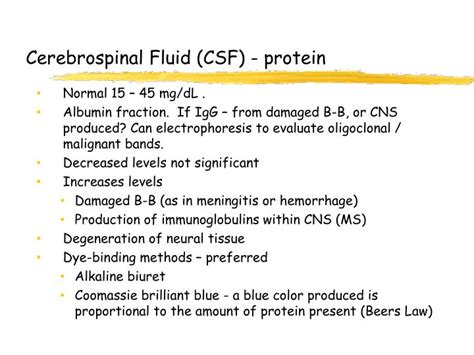Csf Protein: Identify Causes & Symptoms

Cerebrospinal fluid (CSF) proteins are a crucial component of the central nervous system, playing a vital role in maintaining the health and function of the brain and spinal cord. The presence of abnormal protein levels in the CSF can be an indicator of various neurological conditions, making it essential to understand the causes and symptoms associated with CSF protein imbalances. In this article, we will delve into the world of CSF proteins, exploring their functions, causes of imbalances, and symptoms, as well as the diagnosis and treatment options available.
Introduction to CSF Proteins

Cerebrospinal fluid is a clear, colorless liquid that surrounds the brain and spinal cord, providing cushioning, support, and protection from injury. The CSF contains various proteins, including albumin, globulins, and immunoglobulins, which are essential for maintaining the health and function of the central nervous system. These proteins help to regulate the balance of fluids, maintain the integrity of the blood-brain barrier, and facilitate the removal of waste products from the brain.
Functions of CSF Proteins
CSF proteins perform several critical functions, including:
- Regulating the balance of fluids in the brain and spinal cord
- Maintaining the integrity of the blood-brain barrier
- Facilitating the removal of waste products from the brain
- Providing immunological protection against infections and diseases
- Regulating the growth and development of neurons and glial cells
Causes of CSF Protein Imbalances

CSF protein imbalances can occur due to various factors, including:
Infections, such as meningitis and encephalitis, can cause an increase in CSF protein levels, as the body’s immune response leads to the production of inflammatory proteins. Autoimmune disorders, such as multiple sclerosis, can also cause CSF protein imbalances, as the immune system mistakenly attacks the central nervous system. Additionally, trauma to the brain or spinal cord can lead to CSF protein imbalances, as the blood-brain barrier is disrupted, allowing proteins to leak into the CSF.
Other Causes of CSF Protein Imbalances
Other causes of CSF protein imbalances include:
- Tumors, such as brain or spinal cord tumors
- Stroke or cerebral vasculitis
- Neurodegenerative diseases, such as Alzheimer’s or Parkinson’s
- Guillain-Barré syndrome
- Subarachnoid hemorrhage
Symptoms of CSF Protein Imbalances
The symptoms of CSF protein imbalances can vary depending on the underlying cause, but common symptoms include:
Headache and confusion are common symptoms of CSF protein imbalances, as the increased pressure and inflammation in the brain can cause discomfort and impaired cognitive function. Seizures can also occur, as the abnormal protein levels disrupt the normal functioning of neurons and glial cells. Additionally, weakness or paralysis of the limbs can occur, as the CSF protein imbalances affect the motor neurons and muscle function.
Other Symptoms of CSF Protein Imbalances
Other symptoms of CSF protein imbalances include:
- Nausea and vomiting
- Fever
- Sensitivity to light or sound
- Difficulty with speech or swallowing
- Blurred vision or double vision
Diagnosis and Treatment of CSF Protein Imbalances
Diagnosing CSF protein imbalances typically involves a combination of physical examination, medical history, and laboratory tests, including:
| Test | Description |
|---|---|
| Lumbar puncture (LP) | A procedure to collect CSF for analysis |
| CSF protein analysis | A laboratory test to measure the levels of proteins in the CSF |
| Imaging studies | CT or MRI scans to visualize the brain and spinal cord |
| Electrophysiological tests | EEG or EMG tests to evaluate the electrical activity of the brain and muscles |

Treatment Options for CSF Protein Imbalances
Treatment for CSF protein imbalances depends on the underlying cause, but may include:
- Antibiotics or antiviral medications to treat infections
- Corticosteroids to reduce inflammation and swelling
- Pain management medications to alleviate headache and discomfort
- Physical therapy to improve mobility and strength
- Surgery to relieve pressure or repair damage to the brain or spinal cord
What are the normal levels of CSF proteins?
+The normal levels of CSF proteins vary depending on the individual and the laboratory test used. However, in general, the normal range for CSF protein is between 15-45 mg/dL.
What are the risks of untreated CSF protein imbalances?
+Untreated CSF protein imbalances can lead to serious complications, including increased intracranial pressure, brain damage, and even death. It is essential to seek medical attention immediately if you are experiencing symptoms of CSF protein imbalances.
Can CSF protein imbalances be prevented?
+While some causes of CSF protein imbalances cannot be prevented, taking steps to maintain a healthy lifestyle, such as getting regular exercise, eating a balanced diet, and managing stress, can help to reduce the risk of developing certain conditions that can lead to CSF protein imbalances.


